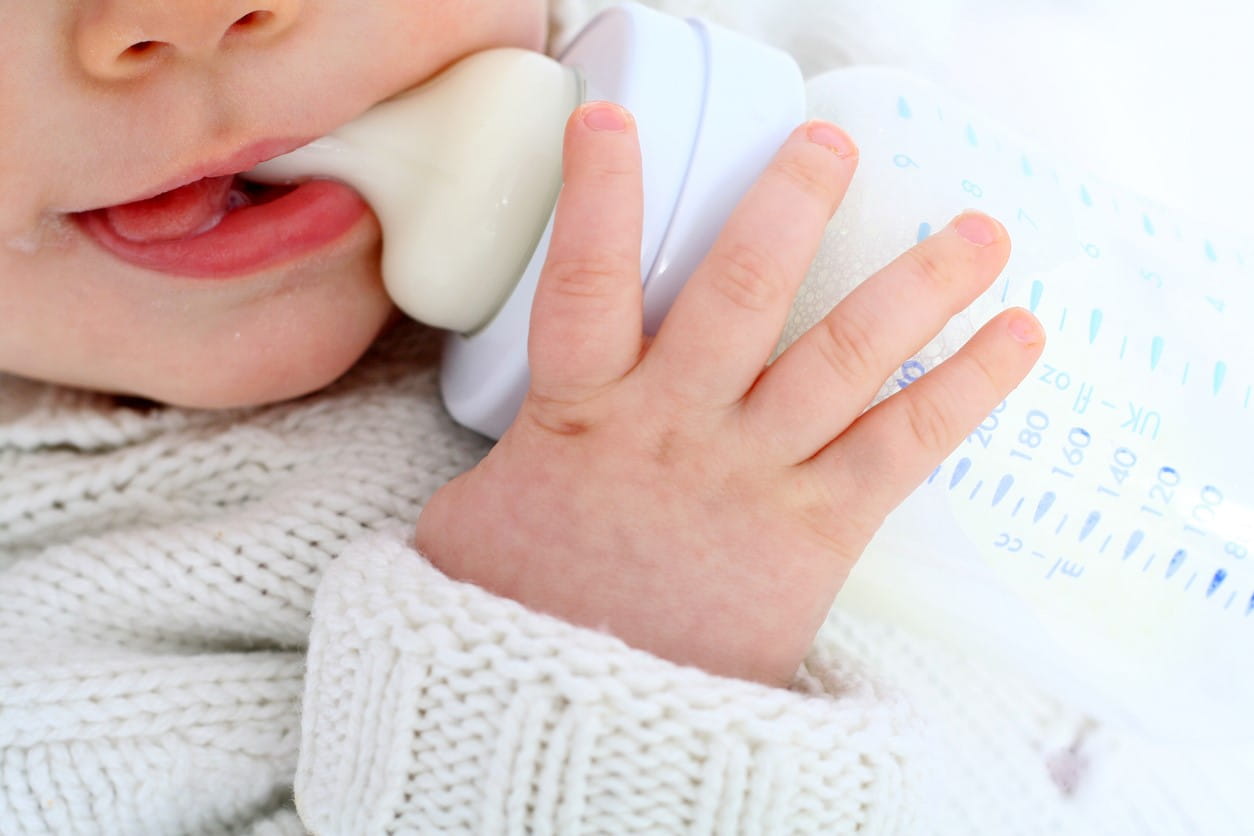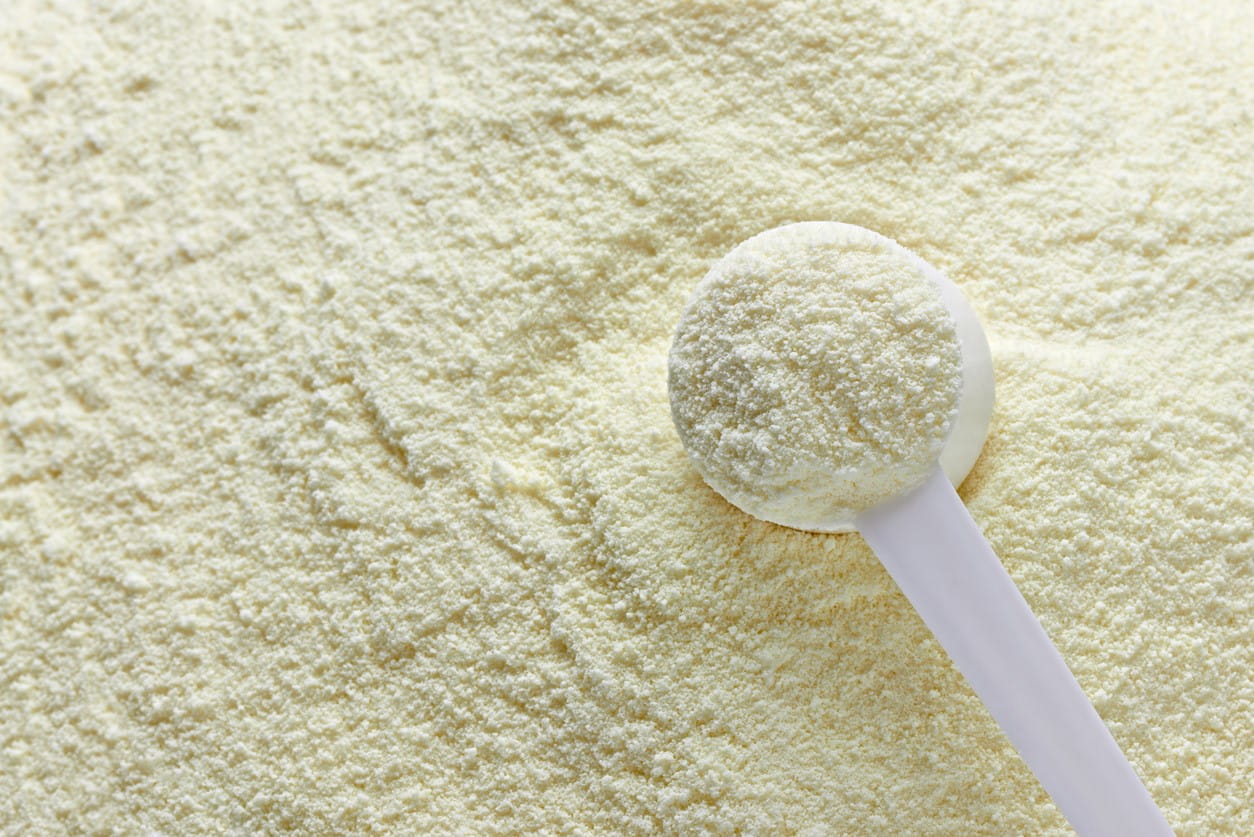Baby Formula Recall, Cronobacter Contamination

The Bottom Line
Powdered infant formula is not required to be sterile, and in rare cases it may be contaminated with bacteria. Cronobacter contamination of powdered infant formula can cause serious illness in infants, including meningitis and death.

The Full Story
Infant formula was initially invented and patented in 1865. The first infant formulas were created from wheat, cow’s milk, malt flour, and potassium bicarbonate. Soon after, evaporated milk was marketed as a nutritional source for infants. In the 1930’s, the American Medical Association developed standards for the safety and quality of infant formula, and by the 1940’s formula was accepted as a safe substitute for breastfeeding by both physicians and the public.
Currently, various brands of infant formula are sold in both liquid and powdered formulations. In the United States, the manufacturing process of infant formula is highly regulated, and ingredients must conform to certain nutritional and safety standards. Liquid formula is required to be sterile (free of biological contaminants) according to these regulations, but powdered formula is not. Due to concern for infections that can occur after consumption of non-sterile powdered formula, premature babies or infants with compromised immune systems should consume liquid, not powdered, infant formula.
Salmonella and Cronobacter are bacterial organisms that can contaminate powdered infant formula and cause potentially life-threatening infections in susceptible individuals. Salmonella infection can affect healthy infants who consume powdered infant formula, while babies affected with Cronobacter are typically premature, very young, or have underlying serious medical conditions. There are 7 types of Cronobacter bacteria, but fortunately only a few species are known to cause infections in infants.
Cronobacter bacteria are very common in nature, and are found in soil, water, and even on insects. The bacteria are present in vegetables, cereal, milk, and fish, and are even found in chocolates and cakes. Cronobacter can also be detected in common household items including vacuum cleaners and on kitchen utensils. Because the bacteria are found throughout the natural environment, they can easily spread throughout facilities that manufacture infant formula. For example, Cronobacter contamination can occur when workers walk across the manufacturing plant wearing shoes that carry the bacteria on the soles. Cronobacter cannot survive exposures to high temperatures (greater than 70 degrees Celsius or 158 degrees Fahrenheit), so pasteurization is effective in limiting Cronobacter in powdered infant formula. However, contamination can still occur after pasteurization and prior to final product packaging.
Several properties of Cronobacter allow it to grow and thrive in dry environments such as powdered infant formula. Sialic acid is a compound added to infant formula because of its reported beneficial effects on brain development. Some species of Cronobacter bacteria can utilize the sialic acid present in formula to enhance growth and survival. Additionally, Cronobacter can grow effectively under conditions where the supply of oxygen is limited, such as within a formula container. Once Cronobacter enter the human body, the bacteria are also able to easily survive in the acidic environment of the human stomach.
Cronobacter most often affects infants and can cause severe illness in babies less than four weeks of age as well as premature or immune-compromised infants. Cronobacter infection in infants commonly causes life-threatening infections such as necrotizing enterocolitis (a serious intestinal disease), meningitis (inflammation around the brain and spinal cord), and sepsis (blood poisoning), and mortality rates are high in infected patients. These bacteria can also cause illness in adults, but serious infections are rare. Most cases of Cronobacter infections in adults occur in cancer patients, the elderly, or those with compromised immune systems.
Since Cronobacter infection often causes serious illness, especially in infants, it likely that affected babies would show symptoms that would alert the parent that there is a problem. The initial symptoms of Cronobacter infection in infants involve fever, poor feeding, lethargy, or irritability. Laboratory testing performed in a hospital setting can detect the presence of Cronobacter in blood and other body fluids, but the results of such testing may not be available for several days. Fortunately, many Cronobacter infections can be effectively treated with intravenous antibiotics once the correct diagnosis is established.
For suspected poisonings, get help online with webPOISONCONTROL or call 1-800-222-1222. Both options are free, expert, and confidential.
Medical Toxicologist
Poisoned?
Call 1-800-222-1222 or
Prevention Tips
Always wash your hands with soap and water or use hand sanitizer that contains at least 60% ethanol, prior to preparing baby formula or feeding a baby.
Consider using hot water (greater than 70 degrees Celsius or 158 degrees Fahrenheit) to prepare powdered infant formula. Allow the formula to cool to room temperature before feeding it to a baby.
Sterilize all bottles, nipples, and other items used to feed infants to prevent bacterial contamination.
Do not make or use homemade infant formula. Commercially available infant formulas are highly regulated for nutritional composition as well as safety.
- The first two digits of the code on the formula container are 22-27, AND
- The code on the container contains the letters “K8”, “SH”, or “Z2”, AND
- The expiration date of the formula is April 1, 2022, or later.
This Really Happened
In February 2022, certain Similac, Alimentum, and EleCare powdered infant formulas were recalled due to Cronobacter contamination. Three infants developed Cronobacter infection after consuming the formula, and one infant was diagnosed with Salmonella. All four infants were hospitalized, and one died. An investigation performed by the United States Food and Drug Administration revealed the presence of Cronobacter in the facility where the powdered infant formulas were manufactured, leading to the recall of the three formulas that were made in that facility from September 2021 through January 2022.For More Information
https://www.cdc.gov/cronobacter/index.html
References
Bennour Hennekinne R, Guillier L, Fazeuilh L, Ells T, Forsythe S, Jackson E, Meheut T, Gnanou Besse N. Survival of Cronobacter in powdered infant formula and their variation in biofilm formation. Lett Appl Microbiol. 2018 Jun;66(6):496-505.
Hochel I, Růžičková H, Krásný L, Demnerová K. Occurrence of Cronobacter spp. in retail foods. J Appl Microbiol. 2012 Jun;112(6):1257-65.
Hunter CJ, Bean JF. Cronobacter: an emerging opportunistic pathogen associated with neonatal meningitis, sepsis and necrotizing enterocolitis. J Perinatol. 2013 Aug;33(8):581-5.
Jaradat ZW, Al Mousa W, Elbetieha A, Al Nabulsi A, Tall BD. Cronobacter spp.--opportunistic food-borne pathogens. A review of their virulence and environmental-adaptive traits. J Med Microbiol. 2014 Aug;63(Pt 8):1023-1037.
Kalyantanda G, Shumyak L, Archibald LK. Cronobacter Species Contamination of Powdered Infant Formula and the Implications for Neonatal Health. Front Pediatr. 2015 Jul 2;3:56.
Losio MN, Pavoni E, Finazzi G, Agostoni C, Daminelli P, Dalzini E, Varisco G, Cinotti S. Preparation of Powdered Infant Formula: Could Product's Safety Be Improved? J Pediatr Gastroenterol Nutr. 2018 Oct;67(4):543-546.
Martin CR, Ling PR, Blackburn GL. Review of Infant Feeding: Key Features of Breast Milk and Infant Formula. Nutrients. 2016 May 11;8(5):279.
Osaili TM, Shaker RR, Al-Haddaq MS, Al-Nabulsi AA, Holley RA. Heat resistance of Cronobacter species (Enterobacter sakazakii) in milk and special feeding formula. J Appl Microbiol. 2009 Sep;107(3):928-35.
Stevens EE, Patrick TE, Pickler R. A history of infant feeding. J Perinat Educ. 2009 Spring;18(2):32-9.
Taylor MG, Amerson-Brown MH, Hulten K, Cameron LH, Holzmann-Pazgal G, Edwards MS, Foster CE. Two Cases of Cronobacter Sakazakii Meningitis in Infants: The Importance Of Early Advanced Brain Imaging and Public Health Reporting. Pediatr Infect Dis J. 2021 Sep 1;40(9):e346-e348.
Poisoned?
Call 1-800-222-1222 or
Prevention Tips
Always wash your hands with soap and water or use hand sanitizer that contains at least 60% ethanol, prior to preparing baby formula or feeding a baby.
Consider using hot water (greater than 70 degrees Celsius or 158 degrees Fahrenheit) to prepare powdered infant formula. Allow the formula to cool to room temperature before feeding it to a baby.
Sterilize all bottles, nipples, and other items used to feed infants to prevent bacterial contamination.
Do not make or use homemade infant formula. Commercially available infant formulas are highly regulated for nutritional composition as well as safety.
- The first two digits of the code on the formula container are 22-27, AND
- The code on the container contains the letters “K8”, “SH”, or “Z2”, AND
- The expiration date of the formula is April 1, 2022, or later.
